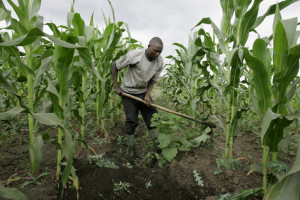Nigeria looks to technology to resolve ancient rivalries

A farmer prepares water channels in his maize field in Ngiresi near the Tanzanian town of Arusha on Tuesday, July 17, 2007. Millions of farmers around the world will be affected by a growing movement to change one of the biggest forces shaping the complex global food market: subsidies. Many experts agree farmers need help to grow food year in and year out, but Western farmers may get too much and African farmers too little. (AP Photo/Karel Prinsloo)
Distrust between farmers and herdsmen has led to Nigeria looking at technology to resolve rivalries.
World Bulletin / News Desk
At the heart of the seemingly intractable crisis in Nigeria’s “Middle Belt” – a region populated mainly by minority ethnic groups – is pervasive distrust between farmers and herdsmen.
Now, however, local activists are looking to new technology in hopes of resolving the longstanding rivalry between the two groups.
Farmers and herdsmen in the region accuse one another of damaging the other’s economic lifeline, resulting in endless fights that have claimed thousands of lives –Â and crippled local business –Â over the years.
Farmers accuse herdsmen of destroying their farmlands in order to feed their cattle; herdsmen, for their part, accuse farmers of stealing their livestock.
“These accusations and counter accusations have led to bitter clashes that have claimed several lives,” Mazi Okwu Okwu, a Nigerian public affairs commentator, told Anadolu Agency.
“The situation is not helped by both sides’ claims of land ownership and the fact that both are of different ethnic origin and practice different faiths,” Okwu said.
“These primordial divisions have made what is purely an economic rivalry assume an ethno-religious dimension in many cases, especially in the north-central region and the Middle Belt,” the commentator added.
Local stakeholders have called for the establishment of dedicated grazing zones with a view to limiting damage to farmland. Experts, however, warn that frequent cattle rustling –Â the mass theft of livestock –Â is fostering enmity, bloodshed and economic losses across the country’s northern region.
“Traditionally, cattle rustling has been driven by the criminal intent to expropriate cows for meat or for sale,” according to Yunusa Yau, executive director of the Center for Information Technology and Development (CITAD), a Nigerian NGO that is working on finding solutions to the problem.
“Over the years, cattle rustling has evolved into a pattern of organized crime of immense sophistication and efficiency,” Yau said.
But this is just one aspect of the phenomenon.
Sufyan Lawal Kabo, CITAD’s media officer, said cattle rustling can also have an ethno-religious dimension, depending on what part of the region it is occurring in.
In recent years, the longstanding rivalry between farmers and herdsmen has also surfaced in southern Nigeria, occasionally leading to bitter clashes.
According to Kabo, cattle rustling is a purely economic crime –Â carried out largely by criminal gangs –Â in most parts of the northeastern Bauchi State, while most incidents of livestock theft in the northwestern Zamfara State are directly attributable to “sectarian issues”.
“What we found in Zamfara is completely different from the perception of gangs of robbers simply stealing cattle. Rather, it is a sectarian problem in which certain Fulani tribesmen are avenging past wrongs by Fulani from other areas,” Kabo said.
“Cattle rustling in this case is a form of revenge, committed by one section of the Fulani community against their fellow Fulani,” Kabo explained.
But in the Middle Belt – as in Nigeria’s Plateau, Taraba and Benue states, where Hausa-Fulani herdsmen often clash with local farmers of different ethnic and religious backgrounds – the scenario is completely different.
“Cattle rustling in Benue, Plateau and Kaduna states has ethno-religious undertones. Some of the farmers there kill cattle men and kill their cattle for allegedly destroying their farms,†Kabo told Anadolu Agency.
“This is pure revenge,†he asserted. “Like I said, the reasons differ from place to place.â€
 Looking to technology
According to Yau, CITAD is currently moving from state to state teaching herdsmen how to use technology to end the longstanding phenomenon.
“As part of CITAD’s peace building efforts, we are holding seminars for herdsmen on the use of a technology we call the Cattle Rustling Information System (CaTRIS) to document, track and help rescue cattle from rustlers,” he said.
At the seminars, herdsmen are taught how to use social media –Â under the rubric of CaTRIS –Â and set up networks of volunteers to track down and rescue stolen livestock.
According to Yau, CaTRIS involves “geomapping cattle tracks and grazing reserves to allow victims of cattle rustling to send information by text message, whatsapp or other forms of social media to the network control center.â€
The center, he added, “then broadcasts the information – using various channels – to a network of volunteers who help relocate the stolen cattle.”
Yau believes that tracking stolen cattle will be easy for volunteers who have access to instantaneous “geo-referenced information” as to where the incident occurred and the routes affected.
But beyond deploying technology to find cattle thieves, Yau also believes that the government must address cattle rustlers’ longstanding grievances and provide effective security in all cattle-rearing communities and along traditional nomadic routes.
